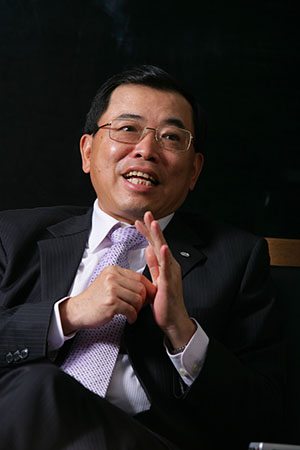Founded in 1981, the TCL Corporation is one of China’s largest consumer electronics groups. The group has been a pioneer in the globalization of Chinese companies. With the purchase of a majority stake in French television producer Thomson SA in 2003, TCL embarked on a globalization strategy which has allowed the company to become the world’s sixth-largest producer of television products (as of 2011). The Thomson acquisition, however, also came in for a lot of criticism for various technological reasons.
With new marketing strategies such as an exclusive product placement deal with the Hollywood blockbuster Iron Man 3 or its recent purchase of the naming rights of Hollywood’s iconic Chinese Theater, TCL has taken its slogan ‘The Creative Life’ to a new level. CKGSB Magazine’s Chinese language sister publication, Chang Jiang (长江) spoke to TCL Chairman and CEO Li Dongsheng on the challenges before the company and TCL’s strategy as it continues to globalize.
Q. When you acquired Thomson’s color TV arm, Jack Welch said, “I sold it out because it was unprofitable, so I have no way to make it profitable to you either”, and added, “Mr. Li now faces a great challenge of global significance”. What do you want to say to Mr. Welch now?
A. It was a great challenge indeed. The path was tougher than expected, but it was the only way forward. So we accumulated technical knowledge, expanded into international markets and developed new channels to boost the globalization of TCL brand. I’m thankful to Mr Welch for recognizing the weight of this challenge. I’ve learned a lot of useful management lessons from him. The experience has helped me to realize how to map out a clear globalization strategy, as well as how to adjust and become tougher in adverse situations. Our color TV arm was profitable in international markets last year, ranking third in color TV shipments and fourth in sales worldwide. These results have been driven by sales in our overseas markets.
Q. How does TCL compare to industry leader, Samsung? What do you think are the key differences between the two companies and what advantages does TCL have over Samsung?
A. Samsung is a good example of success in the consumer electronics industry. They have reached a high level in terms of technical innovation, product quality, global management capabilities and market operations, and have developed rapidly in recent years. We should make further improvements in these respects to enhance our role in the global industry. After three decades of conscientious development, TCL has improved greatly. On one hand, China is rich in resources and is more effective than Korea in terms of material purchase and processing, which allows us to be more competitive across most products. On the other hand, with China’s rising economy and the decline of Japanese, European and American home appliance enterprises, Chinese enterprises will have more opportunities, something that Korean enterprises lack.
Q. What is TCL’s core strategy? What does TCL’s corporate culture value and how are these values established?
A. The core strategy of the TCL brand is to be a pragmatic innovator drawing inspiration from life. Creativity and innovation are the key operating principles of this strategy. We uphold the concept of leading a creative life, the vision of building the most creative global brand and the values of integrity, innovation, and conscientious action. In order to shore up our technical and industrial capabilities as well as the capacity for global operation, we will boost new product generation, and marketing efforts. We will also work to reaffirm our orientation and values.
Q. How do you view the marketing strategies implemented by TCL’s competitors in the 3G field?
A. 3G has always been a field where mobile phone brands compete fiercely with one another, and an industry dominated by Apple and Samsung has emerged in recent years. Statistics shows how the profits of these two brands have exceeded the total profits of all the other brands in the industry. If you consider Apple’s intelligent experience marketing strategy, and the regional marketing strategies of many Chinese brands, it becomes obvious that marketing strategies must be based on products. So developing powerful products is most critical, and therefore it is the emphasis of our work.
Q. As labor costs increase, what competitive advantages do you think Chinese manufacturers can leverage?
A. Though the advantage of labor cost has gradually weakened with China’s economic development, domestic market demand has increased and become robust. At the same time, the advantage of industrial associations is also a result of the development of Chinese manufacturing over the decades, including constant improvements in manufacturing processes, production capabilities and processing support, as well as the supply of widespread and diversified materials and parts, among others. Of course Chinese manufacturing needs to be further improved. To be more valuable in the international economy, Chinese manufacturing must become more innovative, and enterprises must develop and adopt international management best practices.
(This interview was originally published in CKGSB’s Chinese language magazine Cheung Kong (长江))




















